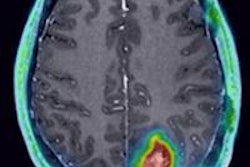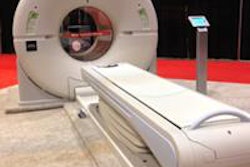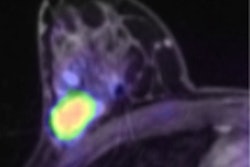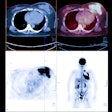Dear AuntMinnie Member,
Ultrasound screening is a useful tool for finding deep vein thrombosis (DVT) in cancer patients, according to a new study we're covering in our Ultrasound Digital Community.
Researchers from the University of Rochester studied a small group of high-risk patients and found that almost 10% had asymptomatic DVT on baseline scans. The finding is important, as cancer patients are more likely to develop venous thromboembolism, and those who have such clots are two to three times more likely to die than patients who don't.
Learn more about the protocol they used by clicking here, or visit our Ultrasound Digital Community at ultrasound.auntminnie.com.
New PET tracer for brain tumors
Meanwhile, a new PET radiopharmaceutical that could be more useful than FDG for brain tumors is under investigation at the University of Wisconsin's UW Health system.
Researchers there believe that iodine-124 CLR1404 could become both a diagnostic and therapeutic agent for multiple solid tumors, with brain cancer as one of the first indications. The radiotracer is taken up by cancer stem cells, which are resistant to radiation therapy and chemotherapy and can lead to disease progression if they aren't eradicated.
The UW Health group has conducted extensive studies with the radiotracer in animals, but last month the researchers presented their first results in humans. Find out what they discovered by clicking here, or visit our Molecular Imaging Digital Community at molecular.auntminnie.com.
Teleradiology in Turkey
If you thought teleradiology in the U.S. was in a state of flux, wait until you find out what's going on in Turkey.
In an article in our AuntMinnie Middle East section, contributing writer Frances Rylands-Monk describes the dramatic changes that have been going on in Turkey as the central government tries to improve the quality of healthcare in the country.
Turkey is set to deploy a fleet of 100 mobile mammography vans over the next year, with the breast screening studies to be read in centralized locations. But Turkish radiologists are concerned about quality issues, especially as broader economic problems force radiologists to dramatically boost reading volumes to keep their salaries level.
Read more by clicking here, or visit the section at me.auntminnie.com.




















